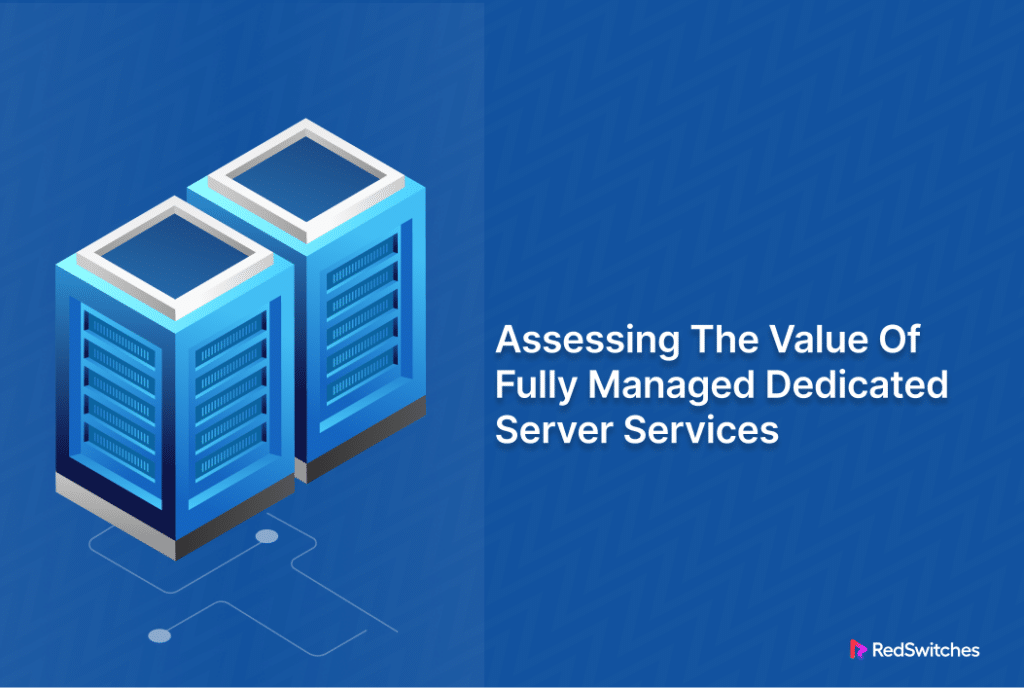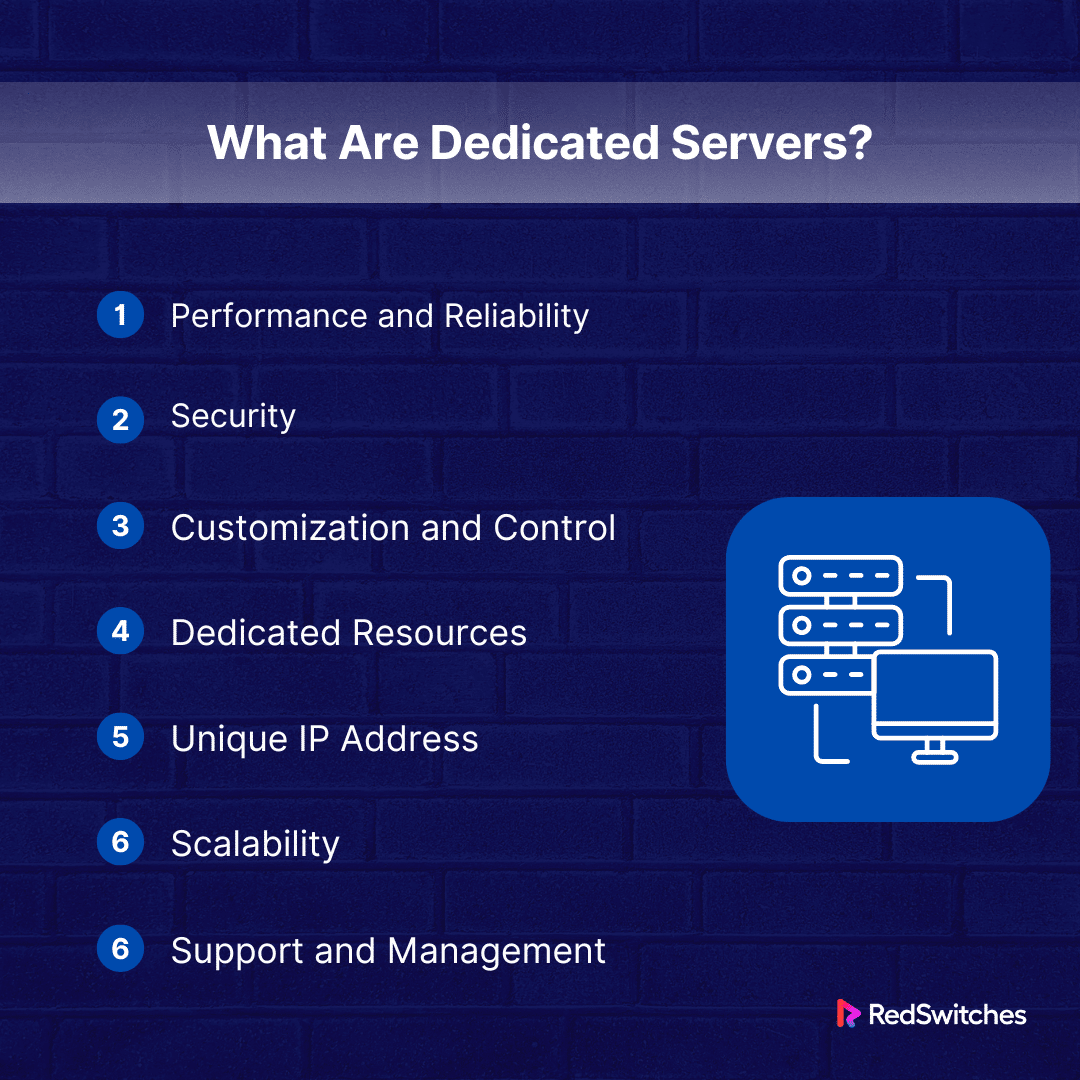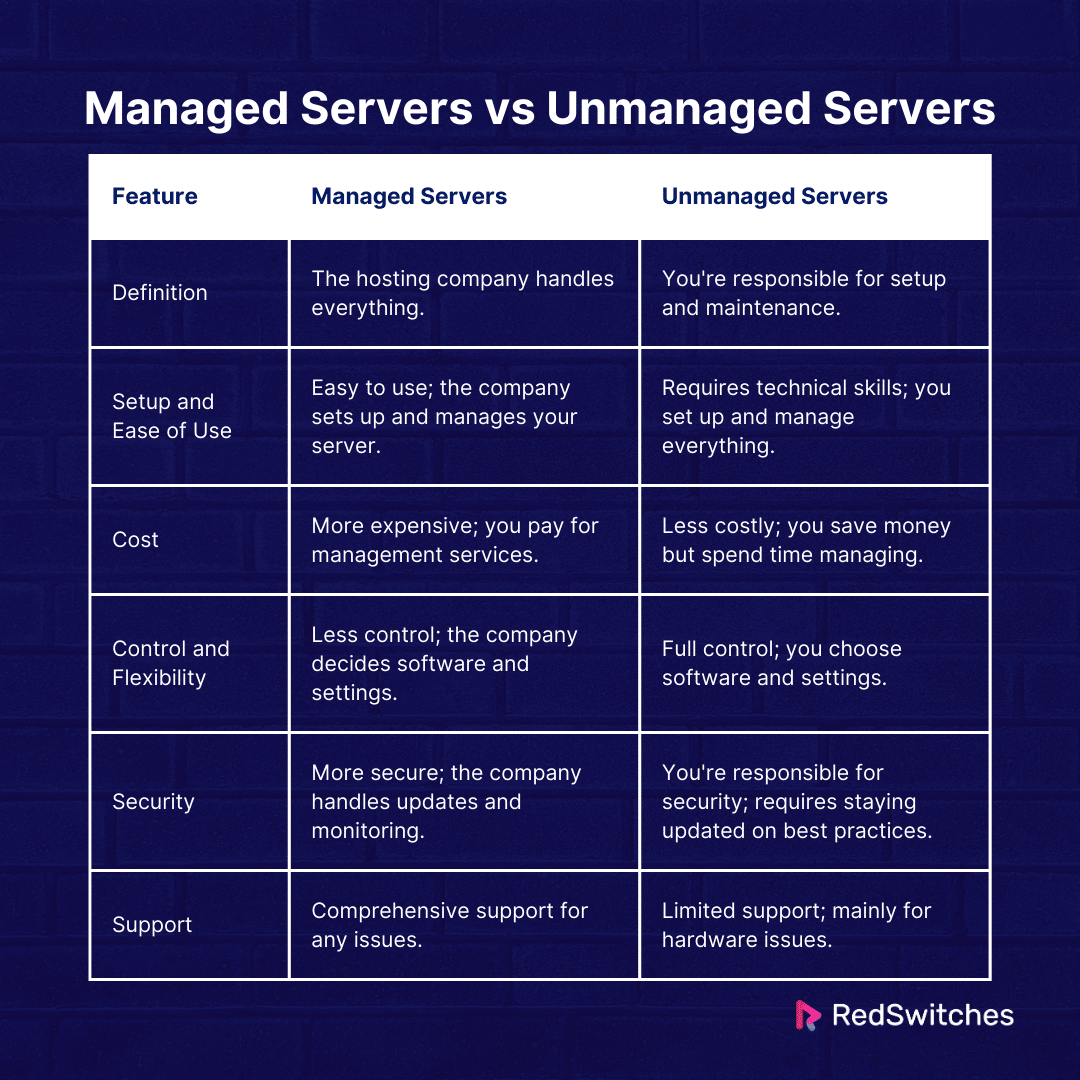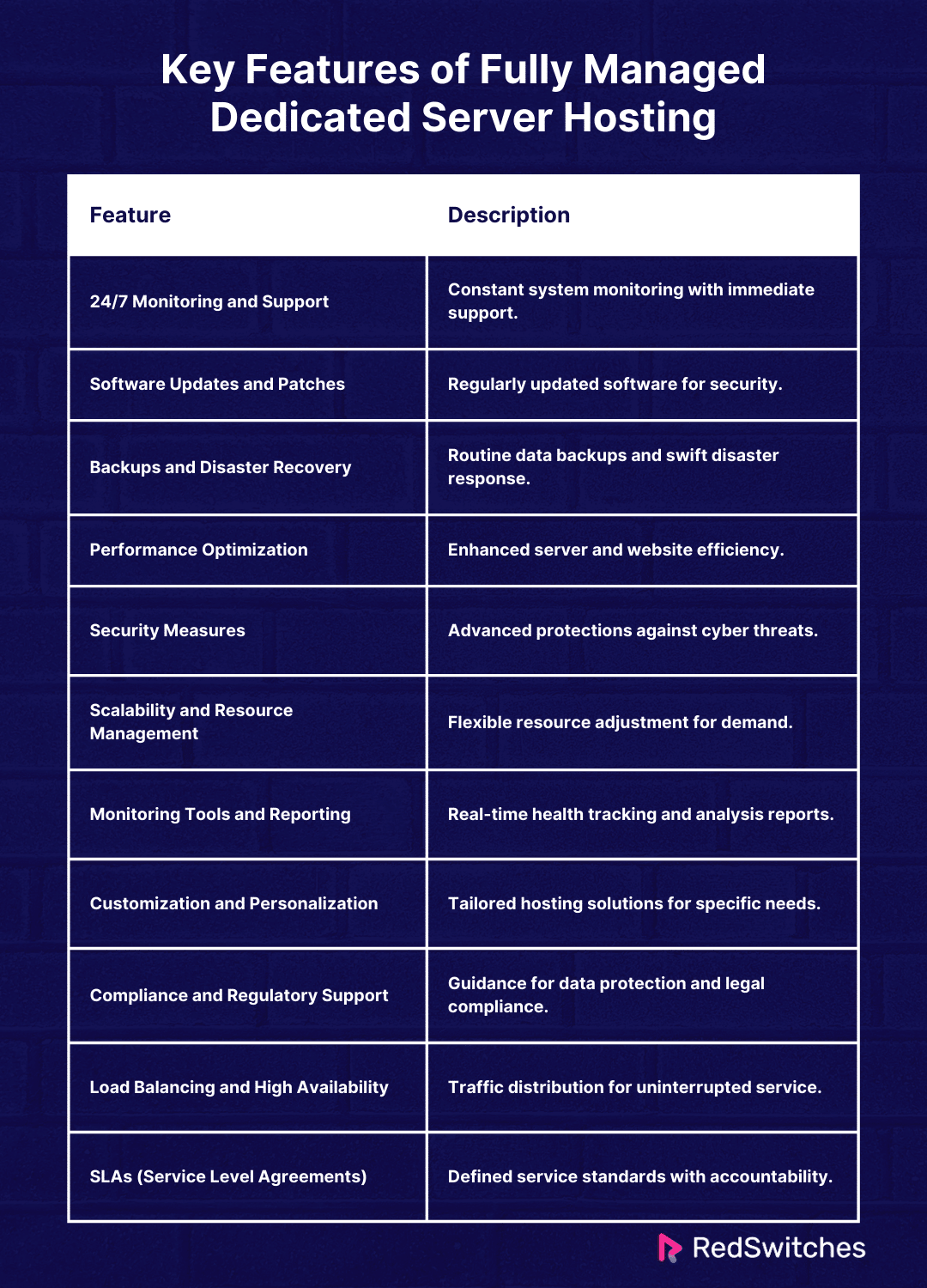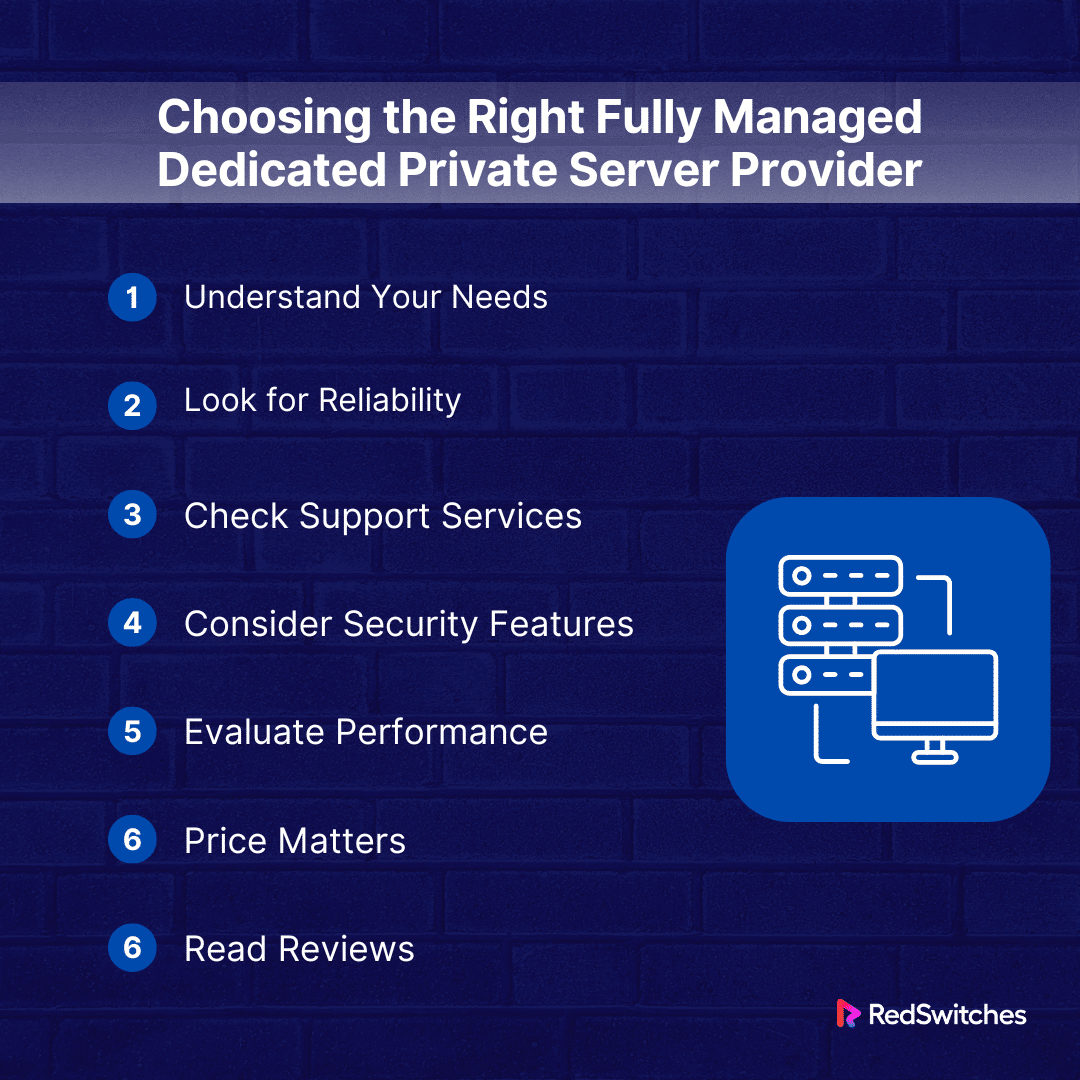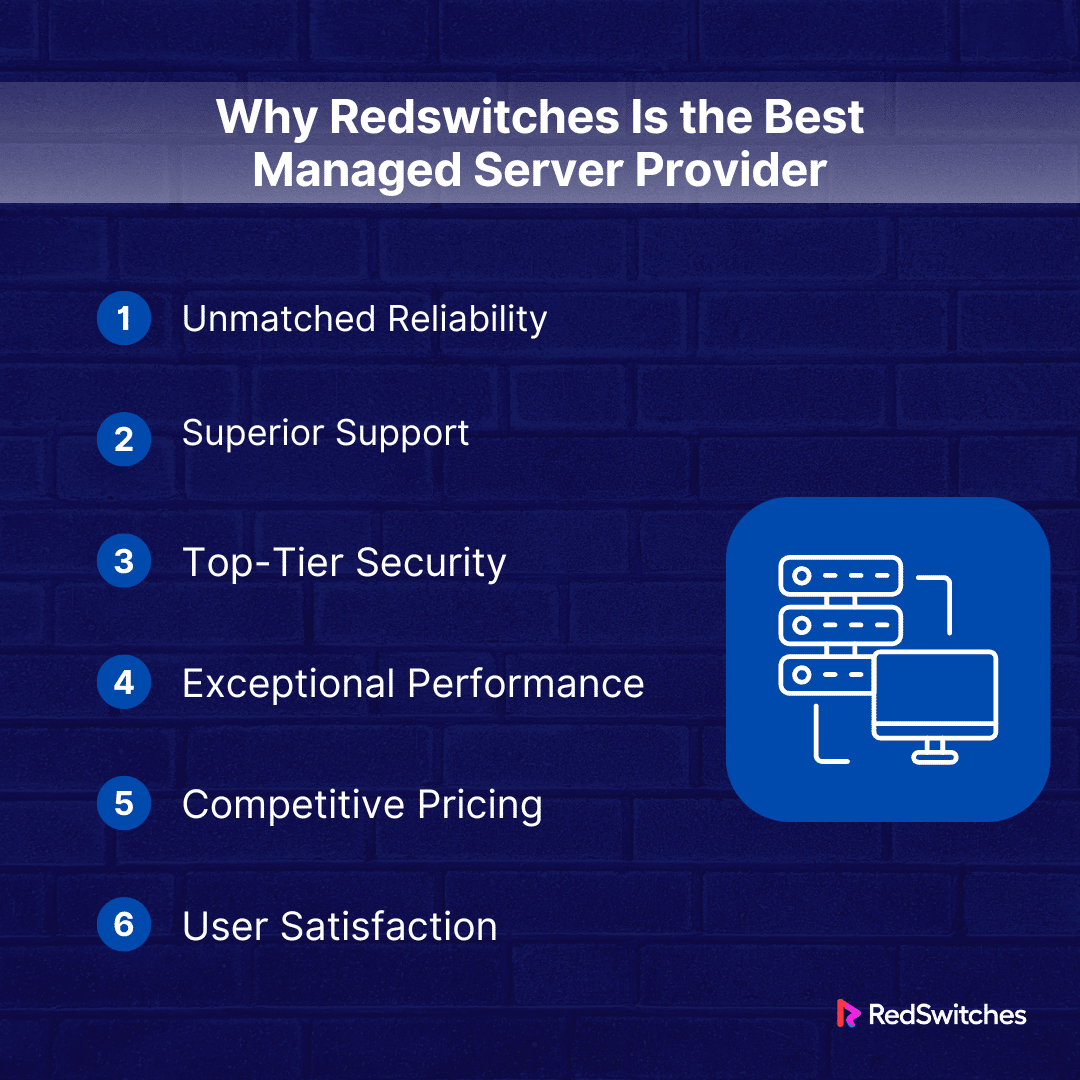Key Takeaways
- Fully managed dedicated server services offload IT management, boosting focus on core activities.
- Dedicated hosted servers provide exclusivity, enhancing performance, security, and control for a single user.
- High uptime and robust resources on dedicated hosted servers ensure reliable and fast website operations.
- Managed services offer top-notch security settings and monitoring, which are critical for handling sensitive data.
- Complete control over server settings allows for custom configurations, optimizing for specific needs.
- Scalability in managed servers supports business growth with easy resource upgrades.
- Expert support and management from service providers resolve issues swiftly, allowing businesses to concentrate on their primary operations.
- Unique IP addresses with dedicated hosted servers benefit SEO and e-commerce security through SSL certification.
- Like full-service hotels, managed servers handle all technical tasks, offering ease and security.
- Choosing between managed and unmanaged servers depends on the need for control versus convenience and expertise.
In the digital age, businesses face the challenge of managing complex IT infrastructures. The global average cost of a data breach in 2023 reached USD 4.45 million, a 15% increase over 3 years. This rise in costs highlights the growing need for fully managed dedicated hosted server services. These services offer businesses a way to offload the technical management of servers to experts, allowing them to focus on their core activities.
This article explores the advantages of fully managed server services. As businesses grow, so does the need for reliable, secure, high-performing IT infrastructure. A managed server offers a solution, handling the complexities of server management, and allowing businesses to focus on their core operations.
The aim is to provide insights into how these services can boost business performance by offering stability and scalability.
Table of Contents
- Key Takeaways
- What Are Dedicated Servers?
- Managed Vs Unmanaged Servers
- Key Features of Fully Managed Dedicated Server Hosting
- 24/7 Monitoring and Support
- Regular Software Updates
- Backups and Disaster Recovery
- Performance Optimization
- Security Measures
- Scalability and Resource Management
- Monitoring Tools and Reporting
- Customization and Personalization
- Compliance and Regulatory Support
- Load Balancing and High Availability
- SLAs (Service Level Agreements)
- Choosing the Right Fully Managed Dedicated Private Server Provider
- Why Redswitches Is the Best Managed Server Provider
- Conclusion
- FAQs
What Are Dedicated Servers?
Dedicated servers are powerful computer systems designed for a specific purpose. They host websites, applications, and data for a single user or organization. Unlike shared servers, a dedicated hosted server serves one client. This exclusivity offers several benefits, including improved performance, security, and control.
Performance and Reliability
Dedicated servers provide high performance. They have robust hardware resources that are not shared with others. This means faster load times for websites and applications. Reliability is another key feature. With a dedicated hosted server, uptime is typically higher. This is crucial for businesses where downtime can mean lost revenue.
Security
Security is a top priority for dedicated hosted servers. Users have full control over security settings, including firewalls, security protocols, and more. Since the server is dedicated to one user, the risk of shared threats is lower, making servers ideal for handling sensitive data.
Customization and Control
Users have complete control over their dedicated hosted server, including the operating system, software, and configurations. This flexibility allows for tailored setups that meet specific needs and optimize performance.
Dedicated Resources
Resources like CPU, RAM, and storage are not shared with servers. This ensures that your applications run smoothly and avoids the “noisy neighbor” effect, which occurs when a shared server’s performance dips because another user consumes too many resources.
Unique IP Address
Each server has its unique IP address. This is important for several reasons. For one, other sites do not affect your site’s reputation, as can happen on shared servers. For businesses, especially those in e-commerce, a unique IP is crucial for SSL certification. This helps in secure transactions.
Scalability
Dedicated hosted servers offer scalability. As your business grows, so can your server’s capacity. Upgrading hardware or adding more resources is straightforward. This flexibility ensures that your server can handle increased traffic or data as your needs evolve.
Support and Management
Managed server services provide expert support. This includes maintenance, updates, and technical assistance. Such support ensures that any issues are quickly resolved. It lets businesses focus on their core operations, knowing their server is in good hands.
Dedicated hosted servers offer a range of features that make them ideal for businesses and individuals with specific hosting needs. They provide a solid foundation for online presence, from performance and reliability to security and control. Understanding these features helps you decide whether a server is the right choice for your hosting needs.
Managed Vs Unmanaged Servers
Choosing the right server for your website or application is crucial. Two main types are managed and unmanaged servers. This guide will explore the key differences between them.
Managed Servers: What Are They?
Managed servers are like full-service hotels. The hosting company handles everything, including setup, maintenance, software updates, and security. You don’t need to worry about the technical details.
Unmanaged Servers: What Are They?
Unmanaged servers are like renting an empty apartment. You have the space, but you must fill it. You’re responsible for setting up the server, updating software, and keeping it secure. It requires technical knowledge.
Key Differences
Here’s a breakdown of the key differences between Managed Vs Unmanaged Servers.
Setup and Ease of Use
Managed Servers: These are easy to use. The hosting company sets up your server and manages technical tasks and updates.
Unmanaged Servers: Requires technical skills. You set up and manage everything. This is time-consuming but gives you full control.
Cost
Managed Servers: More expensive. You pay for the convenience of management services.
Unmanaged Servers: Less costly. You handle the management, saving money but spending time.
Control and Flexibility
Credits: Freepik
Managed Servers: Less control. The hosting company decides on the software and settings. This can limit flexibility but ensures a stable, secure environment.
Unmanaged Servers: Full control. You choose the software and settings. This offers more flexibility but requires you to manage security and updates.
Security
Managed Servers: More secure. The hosting company takes care of security updates and monitoring. They have experts to protect your server.
Unmanaged Servers: You are responsible for security, requiring you to stay updated on and apply security best practices.
Support
Managed Servers: Comprehensive support. The hosting company provides help for any issues, including technical support and troubleshooting.
Unmanaged Servers: Limited support. The hosting company may help with hardware issues. But you handle software and technical problems.
Choosing between managed and unmanaged servers depends on your needs, skills, and budget. Managed servers offer ease, security, and support at a higher cost. Unmanaged servers give you control and flexibility with lower prices. Consider what’s most important for your project when deciding.
Key Features of Fully Managed Dedicated Server Hosting
Fully managed dedicated hosting offers a robust solution for websites with high traffic volumes or specific custom requirements. This type of hosting provides clients with a reliable dedicated server that is not shared with others. It ensures optimal performance, security, and customization. Below are critical features of fully managed dedicated hosting. These features focus on delivering a seamless, efficient, and secure web hosting experience.
24/7 Monitoring and Support
Fully managed dedicated hosting ensures your server is always watched. Experts monitor your server’s performance and security day and night. They work to keep your server running without issues.
Proactive Issue Resolution
This service takes a proactive approach. It aims to spot and fix problems before they impact your website. The goal is to keep your site up and running smoothly, without interruption.
Expert Support Team
A team of professionals is ready to help you anytime. They offer 24/7 support for server configurations, technical troubles, or questions. This is crucial for businesses that depend on their website’s constant uptime and performance.
Regular Software Updates
Fully managed dedicated hosting handles software updates and patches. This means the server’s operating system and software are always up to date. Updates bring security improvements, bug fixes, and better performance. Keeping your server current lowers the risk of security threats and ensures your website runs smoothly.
Patch Management for Enhanced Security
Patches address specific problems or security risks in server software. Managing these patches is vital for server security. It prevents hackers from exploiting known weaknesses. Fully managed hosting often automates this process. This guarantees quick application of patches, boosting your server’s security and dependability.
Backups and Disaster Recovery
Protect your data with comprehensive backup and disaster recovery solutions. In web hosting, ensuring data safety and quick disaster recovery is crucial. Backups and disaster recovery are two pillars that support this need. Let’s delve into what these terms mean and why they’re essential.
Understanding Backups
Credits: Freepik
Backups refer to the process of copying and archiving data. This step is crucial for restoring original data in case of loss. There are various types of backups:
- Full Backups: This method copies all data. It’s the most comprehensive but requires more storage and time.
- Incremental Backups: Only the changes are saved since the last backup after an initial full backup. This method is faster and requires less space.
- Differential Backups: These also start with a full backup. However, subsequent backups contain all changes made since the initial full backup, not just since the last backup.
A well-planned backup strategy combines these types to optimize space and recovery time.
The Role of Disaster Recovery
Disaster recovery goes beyond backups. It’s a set of policies and tools designed to restore vital systems following a disaster quickly. This can include natural disasters, cyber-attacks, or hardware failures. The goal is to minimize downtime and data loss, ensuring business continuity.
Key components of a disaster recovery plan include:
- Recovery Point Objective (RPO): This defines how much data loss is acceptable, measured in time.
- Recovery Time Objective (RTO): This sets the maximum time to restore operations to minimize impact.
Effective disaster recovery plans are regularly tested and updated to adapt to new threats and changes in the business environment.
Performance Optimization
Performance optimization is about enhancing a website’s efficiency and speed. This not only improves user experience but also benefits search engine rankings. Let’s explore the main areas where managed server services focus.
Server Configuration
Optimizing server configuration is vital. This involves adjusting settings to ensure the server can handle high-traffic loads efficiently. Load balancing, caching strategies, and resource allocation are critical areas to address.
Content Delivery Network (CDN)
A CDN is a network of servers distributed globally. It stores copies of your site’s static content (like images and CSS files). When a user visits your site, the CDN delivers this content from the nearest server. This reduces latency and speeds up loading times.
Database Optimization
Credits: Freepik
Databases can become a bottleneck if not properly managed. Regular maintenance tasks such as indexing, query optimization, and cleaning up old data help keep database performance optimal.
Code Optimization
How your website’s backend and frontend code is written can significantly affect performance. Efficient code runs faster and consumes less server resources. Techniques include minimizing HTTP requests, compressing files, and using efficient algorithms.
Security Measures
In today’s digital age, the security of online platforms cannot be overstated. Robust security measures protect against data breaches, cyberattacks, and unauthorized access. Let’s explore the critical components that ensure a fortified environment.
Regular Security Audits
Security audits are comprehensive evaluations of an organization’s information system. They identify vulnerabilities and ensure compliance with the latest security standards. These audits cover everything from software systems to user practices and network infrastructure.
Firewalls and Intrusion Detection Systems (IDS)
Firewalls are the first line of defense, controlling incoming and outgoing network traffic based on predetermined security rules. Intrusion Detection Systems (IDS), on the other hand, monitor network traffic for suspicious activity and known threats, alerting the system administrators of potential issues.
Secure Socket Layer (SSL) Certificates
Server SSL certificates are crucial for encrypting data transferred between a user’s browser and the server, making it difficult for hackers to intercept and read the information. This is especially important for websites handling sensitive data like credit card numbers and personal information.
Regular Software Updates
Software updates often include patches for security vulnerabilities discovered since the last update. Keeping software up-to-date is a simple yet crucial step in protecting against cyber threats.
Scalability and Resource Management
Scalability and resource management are essential for accommodating growth and managing workload fluctuations without compromising performance or security.
Understanding Scalability
Scalability is the ability of a hosting service to handle increased loads gracefully by adding resources. This can be scaling up (adding more resources to the existing system) or scaling out (adding more systems to handle the load).
Dynamic Resource Allocation
Modern hosting environments use dynamic resource allocation to distribute resources efficiently. This means assigning more computing power, storage, and bandwidth when demand increases and scaling down during off-peak times. This flexibility ensures optimal performance and cost-efficiency.
Load Balancing
Load balancing distributes traffic across multiple servers to prevent any single server from becoming a bottleneck. This improves the responsiveness and availability of websites and applications, ensuring a seamless user experience. Below, we’ll delve into the details of load balancing.
Monitoring and Predictive Analysis
Credits: Freepik
Continuous monitoring of system performance helps identify patterns and predict future resource needs. This proactive approach allows for timely adjustments, ensuring the infrastructure can handle sudden spikes in demand without performance hitches.
Monitoring Tools and Reporting
In fully managed dedicated hosting, tools for monitoring and reporting are vital. They ensure the server runs smoothly and reliably. These tools give instant updates on server health, how much traffic the site gets, and any security risks. This helps in making quick decisions and managing issues early.
Real-time Performance Checks
Tools that monitor server performance in real time look at CPU and memory usage, disk space left, and data sent and received. By spotting unusual changes, these tools can help fix problems before they get worse.
Analyzing Traffic and Reports
Tools that analyze traffic show what kind of visitors the website is getting and where they come from. This information is crucial for improving the site, planning marketing, and understanding what visitors want. Regular reports give updates on how the site is doing and where it can improve.
Watching for Security Threats
Tools for security keep an eye out for any signs of danger, like attempts to break in, malware, or scams. They scan for weak spots and any evidence of a breach to keep important data and the server safe.
Customization and Personalization
Customizing and personalizing is a big plus of fully managed dedicated hosting. Clients can set up their servers just how they want, ensuring everything works well for their business.
Choosing Server Setup
Clients can pick the server setup that fits their needs and budget. This includes deciding on the server’s power, memory, storage, and how it connects to the internet. This choice helps businesses get what they need now and leaves room to grow later.
Installing Specific Software
This type of hosting usually lets clients ask for certain software to be installed. The hosting provider’s tech team can set up any special apps, databases, or development tools needed. This is great for businesses that use unique software or want to keep their tech setup different from others.
Security Just for You
Credits: Freepik
Security for dedicated hosting can be tailored to the client’s needs. This could mean custom firewall rules, special access controls, or extra security services. Custom security helps meet industry rules and keeps the business and its customers safe.
Compliance and Regulatory Support
Adherence to laws and regulations is non-negotiable in the digital realm. Compliance ensures that data protection, privacy, and security standards are met, aligning with legal requirements and industry standards.
Importance of Compliance
Compliance is vital for trust and legality. It protects user data and ensures business operations align with laws. This is crucial for industries like healthcare and finance, where data sensitivity is high.
Regulatory Support in Hosting
Managed hosting providers offer expertise in regulatory requirements, helping businesses navigate complex landscapes like GDPR or HIPAA. This support includes:
- Data protection: Implementing strict security measures to safeguard data.
- Audit readiness: Ensuring businesses are prepared for compliance audits with proper documentation and practices.
- Regular updates: Keeping up with changing regulations and adapting hosting practices accordingly.
Load Balancing and High Availability
Maintaining uninterrupted service is paramount for any online presence. Load balancing and high availability are technologies leading the way in achieving this goal.
Understanding Load Balancing
Load balancing distributes incoming network traffic across multiple servers. This prevents any single server from becoming overloaded, ensuring efficient request handling. It’s a cornerstone for high-availability systems.
Benefits include:
- Improved performance: Distributing traffic optimizes server use, speeding up response times.
- Scalability: Easily add more servers without disrupting the service.
High Availability: Ensuring Continuous Operation
High availability refers to systems designed to be operational without significant downtime. It’s achieved through redundancy and failover processes.
Key components include:
- Redundant systems: Duplicate components, like servers and databases, ensure if one fails, another immediately takes over.
- Failover mechanisms: Automatic switching to a backup system upon failure minimizes service interruptions.
SLAs (Service Level Agreements)
Service Level Agreements (SLAs) are critical in fully managed dedicated hosting. They serve as a bridge between service providers and clients, outline the expected performance and reliability standards, and guarantee a certain level of service.
Core Elements of SLAs
SLAs cover various aspects of the hosting service, including uptime, support response times, and maintenance schedules. Key elements include:
- Uptime Guarantee: SLAs often promise a specific percentage of uptime, ensuring your website remains accessible to users.
- Support Response: They specify how quickly the hosting provider will respond to issues, ranging from immediate to within a few hours, depending on the severity.
- Maintenance and Updates: Scheduled maintenance times and update policies are outlined, ensuring transparency and minimal disruption.
The Importance of SLAs
SLAs are not just formalities; they hold providers accountable, offering clients peace of mind. They ensure that:
- Expectations are clear: Both parties understand the service standards.
- Remedies are defined: Compensation terms for not meeting the agreed levels are outlined, usually as credits toward future service.
- Performance is monitored: Server SLAs encourage providers to maintain high service standards.
Choosing the Right Fully Managed Dedicated Private Server Provider
Finding the rightfully managed dedicated hosted server provider is crucial for your online presence. It affects your website’s speed, uptime, and overall performance. This guide will help you pick the best provider with simple steps and clear language.
Understand Your Needs
Start by knowing what you need. Consider your website’s size, traffic, and special requirements, such as security features. This will help you find a provider who fits your needs perfectly.
Look for Reliability
Reliability is key. You want your website to be available all the time. Look for providers with a high uptime guarantee, usually 99.9% or better. This means your website will rarely be down.
Check Support Services
Support is crucial. If something goes wrong, you need help fast. Make sure the provider offers 24/7 support. They should have various ways to contact them, like phone, email, or live chat.
Consider Security Features
Security protects your website and data. Look for providers that offer robust security measures, such as firewalls, security monitoring, and regular backups. These features will keep your website safe.
Evaluate Performance
Performance affects how fast your website loads. This is important for user experience and search engine ranking. Look for providers with powerful servers and fast network connections. This will ensure your website loads quickly for visitors.
Price Matters
Price is always a consideration. Compare prices between providers, but remember, the cheapest option is not always the best. Consider what you get for your money. A slightly more expensive provider might offer better performance or support.
Read Reviews
Finally, read reviews from other users. This will give you insight into their experiences with the provider. Look for reviews about reliability, support, and overall satisfaction. This can help you make a well-informed decision.
Choosing the rightfully managed server provider is a big decision. By understanding your needs, looking for reliability, checking support services, considering security features, evaluating performance, considering price, and reading reviews, you can find the best provider for your website. Remember, the right provider will offer a blend of performance, support, and security, ensuring your website’s success.
Why Redswitches Is the Best Managed Server Provider
Choosing the right managed server provider is a game-changer in online business and digital presence. We believe Redswitches stands out as the best choice for several key reasons.
Unmatched Reliability
At Redswitches, we prioritize keeping your website up and running at all times. Our commitment to reliability is reflected in our 99.9% uptime guarantee. This means you can trust us to ensure your website is always accessible to your users.
Superior Support
We understand technical issues can arise anytime, so we offer unparalleled support services. Our dedicated team is available 24/7 through phone, email, and live chat. With us, help is always just a message away, ensuring that issues are resolved promptly.
Top-Tier Security
Security is at the forefront of our services. We protect your website with advanced security measures, including state-of-the-art firewalls, continuous security monitoring, and regular backups. With Redswitches, you can have peace of mind knowing your data and your users are safe.
Exceptional Performance
We recognize the importance of website speed and performance for a positive user experience and search engine rankings. That’s why we provide powerful servers and fast network connections. Our infrastructure is designed to ensure that your website loads quickly and smoothly, no matter where your users are.
Competitive Pricing
Credits: Freepik
We believe in offering high-quality services at competitive prices. Our pricing plans are designed to provide the best value, balancing cost with performance, support, and security features. With Redswitches, you get more than what you pay for.
User Satisfaction
Our commitment to our customers is reflected in the positive reviews we consistently receive. Users praise our reliability, support, and overall quality of service. These testimonials are a testament to our dedication to excellence and customer satisfaction.
Choosing Redswitches means opting for a managed server provider that excels in reliability, support, security, performance, and value. Our approach is simple: we provide services that we would want to use ourselves. This customer-centric philosophy is why Redswitches is the best choice for your managed server needs.
Conclusion
Fully managed dedicated hosted server services provide significant advantages for businesses maintaining all aspects of information technology. These services enhance focus on core activities by managing IT needs and ensuring high performance, reliability, security, and scalability.
Servers offer exclusivity, control, and customization, with support and management from experts to swiftly resolve any issues. The choice between managed and unmanaged servers boils down to prioritizing control over convenience and expertise. Businesses today need both control and convenience when it comes to IT infrastructure. Redswitches provides a perfect blend of both.
Ready to elevate your online presence with a dedicated hosted server that offers reliability, security, and unmatched performance? Choose Redswitches. Let us handle the complexities so you can focus on growing your business. Start your journey with RedSwitches today for a seamless, efficient online experience.
FAQs
Q. What is a fully managed dedicated server?
A fully managed dedicated hosted server is a hosting solution where the service provider handles all the technical aspects of server management. This includes security, maintenance, updates, and support. The client doesn’t need to worry about the technicalities and can focus on their business.
Q. What are the benefits of managed dedicated servers?
The benefits include enhanced security, high performance, reliability, and 24/7 expert support. These servers provide scalability for growing businesses and allow custom configurations to meet specific needs. Managed services save time and resources by handling technical management.
Q. What is the difference between managed and unmanaged dedicated servers?
The main difference is the level of service and support. Managed servers come with comprehensive support and management from the provider, covering setup, maintenance, and updates. Unmanaged servers require the client to handle these tasks, offering more control but requiring technical expertise.
Q. What does a managed server mean?
A managed server is a hosting service in which the provider takes care of all the management tasks associated with the server. This includes setup, security, maintenance, and updates, offering businesses a hassle-free hosting environment with expert support.
Q. What are the three (3) types of servers?
- Dedicated Private Servers: Single-tenant servers provide high performance and security for businesses with significant needs.
- Shared Servers: Hosting multiple websites on a single server, offering a cost-effective solution for small websites with lower traffic.
- Virtual Private Servers (VPS) Offer a middle ground between shared and dedicated hosting. A server is divided into virtual machines that provide more resources and flexibility than shared hosting without the cost of a dedicated server.
Q. How do the best dedicated servers differ from VPS hosting?
Best Dedicated servers offer dedicated resources on a physical server for your exclusive use, while VPS hosting divides a server into virtual private servers with shared resources among multiple users.
Q. What benefits do fully managed dedicated servers offer?
Fully managed dedicated servers provide extensive server management, including server monitoring, managed support, and regular updates, enhancing your hosting experience without the need for deep technical knowledge.
Q. Why choose a cheap dedicated server host over shared hosting?
A cheap dedicated server host offers dedicated resources, greater server configuration options, and a more stable hosting environment compared to shared hosting, which divides server resources among multiple websites.
Q. What is the advantage of having a dedicated IP with your hosting plan?
A dedicated IP ensures that your web application or website has its own unique address, improving security, email deliverability, and potentially your SEO ranking.
Q. Why is server monitoring important in managed dedicated server hosting?
Server monitoring is crucial for ensuring optimal performance, security, and uptime by promptly identifying and addressing any issues with the physical server or its software.
Q. How does a bare metal server differ from other hosting options?
A bare metal server is a physical server dedicated to a single tenant, offering high performance and dedicated resources without the overhead of virtualization, unlike VPS or shared hosting.
Q. What should you consider when choosing a hosting provider for WooCommerce hosting?
For WooCommerce hosting, consider a hosting provider that offers dedicated resources, managed support, and hosting plans specifically optimized for WooCommerce to ensure the best possible performance and security for your online store.
Q. What makes Redswitches a recommended option for dedicated hosting service?
Redswitches is renowned for its fully managed hosting, robust server solutions, including dedicated hosted servers and VPS hosting, backed by an expert support team, making it an excellent choice for businesses seeking a reliable hosting provider.
